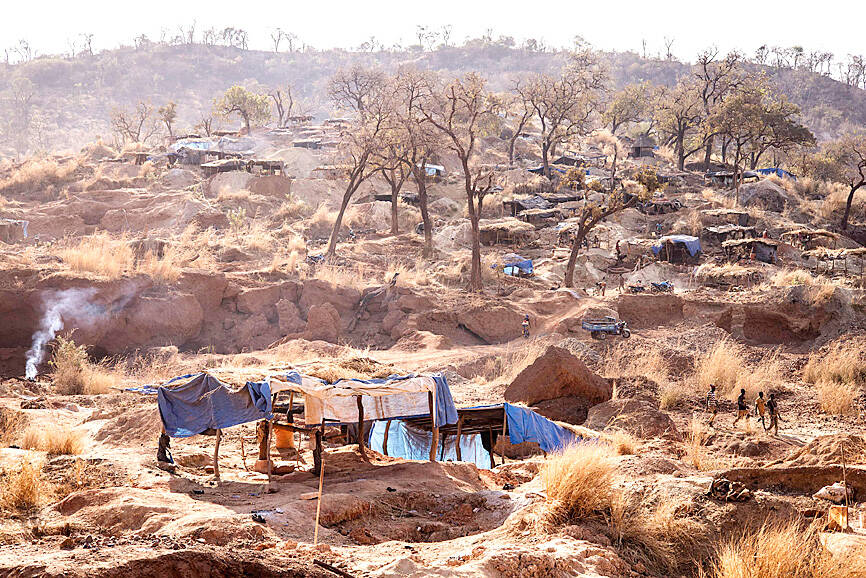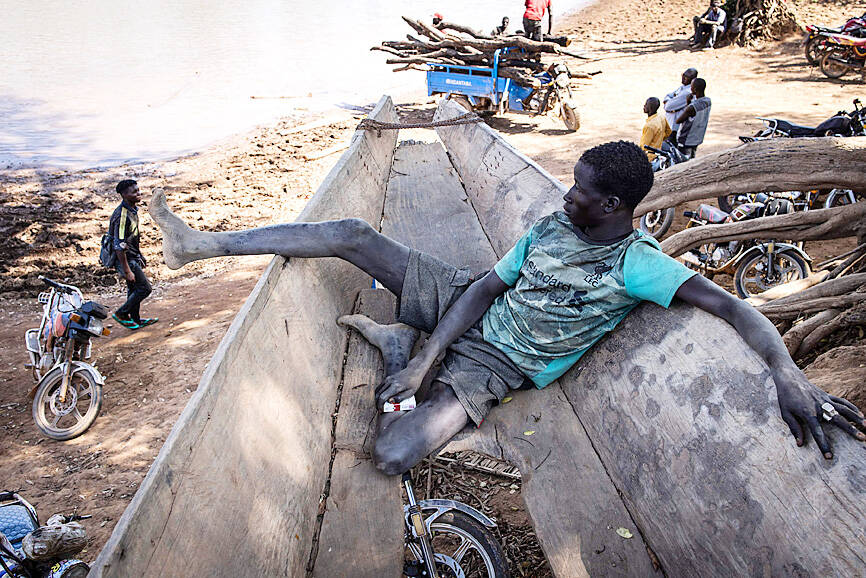Mohamed Bayoh climbed into the deep, pitch-black hole, hoping to emerge with a nugget that would change his life.
The 26-year-old Guinean is one of thousands of west Africans who have flocked to remote eastern Senegal in search of gold.
The rush for the precious metal has dramatically transformed Bantakokouta, a town on the borders of Mali and Guinea.

Photo: AFP
The locals numbered just a few dozen two decades ago, now there are several thousand on the back of a floating population of dream-seekers and risk-takers with gold in their eyes.
Their ant-like labor has left the landscape looking like a Swiss cheese.
As far as the eye can see, through the pervasive dusty mist, small huddled groups protected from the sun by makeshift branch shelters haul up spoil scratched from the ground.

Photo: AFP
Women sit nearby, sorting the rocks into two mounds — a big one for the discards and a much smaller one for the promising samples.
The same scenes are played out every day, with no guarantee of any success.
“Working here is like playing the lottery, you are never sure of winning,” said Bayoh, who added that he was nonetheless determined to stay put until he gets rich.
Other sites in the gold-rich region have been taken over by mining corporations, sometimes triggering land disputes with local people, but in Bantakokouta, informal mining has been allowed to carry on.
Diggers typically stay for a few months — sometimes just days — to chance their arm, hoping for a lucky strike that would enable them to send money home or start a business.
Bayoh was clear in his objective to “find a lot of gold.”
“Not a little ... a lot. To start another life in Guinea,” he added.
After six months’ grueling work, he had earned enough to buy two motorbikes.
One gram of gold — about the size of 60 grains of rice — brings in about 30,000 CFA francs (US$50).
However, the risks facing miners are many, from fatal falls, and cuts and landslips, to use of drugs to dull aches and pains, said Diba Keita, head of a community vigilance committee.
The town itself bears the signs of poverty and transience.
Its alleys are littered with garbage, and goats and sheep roam untended. The vast majority of the huts are rudimentary constructions made of bamboo and brushwood.
In his workshop, Souleymane Segda, a 20-year-old from Burkina Faso, put crushed pieces of promising-looking ore through a grinder.
The apparatus takes up most of his room, which has no toilet and doubles as his bedroom. The young man is covered in dirt as he sifts through the dust in search of flecks of gold.
The flakes are recovered after washing the dust with mercury — a practice that is banned because of its health and environmental risks, but which remains widespread.
“I can earn up to 50,000 CFA francs a day. I go back home as much as I can and when I’ll have earned enough, I will leave for good,” Segda said.
Bantakokouta has experienced a surge of activities familiar to gold rushes around the world — an influx of stores selling tools and electronic goods, places of worship, a medical post, nightclubs, video gaming rooms, and crime and vice.
“The gold has brought wealth. In the past, we used to go to Mako,” a town 20km away, said Waly Keita, 63.
He recalled with nostalgia the time when “our mums” used to dig in the river bed, searching for nuggets, while the men went into the bush to hunt and collect honey.
However, the gold rush has also brought problems, including “banditry” and “conflict,” Keita said.
The Senegalese and foreigners generally get on well in Bantakokouta, although flareups do occur.
In 2020 clashes between security forces and Guinean miners resulted in the death of two young men.
Senegalese authorities have also intensified operations to secure the border with Mali, fearing militants might cross it.
“Eastern Senegal would be a very interesting territory for jihadists, not necessarily for carrying out attacks, but for recruitment and funding,” a Western diplomat said. “The gold mining sites are ideal for finding frustrated young people who want to earn money, and gold is very easy to hide and trade.”

Four people jailed in the landmark Hong Kong national security trial of "47 democrats" accused of conspiracy to commit subversion were freed today after more than four years behind bars, the second group to be released in a month. Among those freed was long-time political and LGBTQ activist Jimmy Sham (岑子杰), who also led one of Hong Kong’s largest pro-democracy groups, the Civil Human Rights Front, which disbanded in 2021. "Let me spend some time with my family," Sham said after arriving at his home in the Kowloon district of Jordan. "I don’t know how to plan ahead because, to me, it feels

The collapse of the Swiss Birch glacier serves as a chilling warning of the escalating dangers faced by communities worldwide living under the shadow of fragile ice, particularly in Asia, experts said. Footage of the collapse on Wednesday showed a huge cloud of ice and rubble hurtling down the mountainside into the hamlet of Blatten. Swiss Development Cooperation disaster risk reduction adviser Ali Neumann said that while the role of climate change in the case of Blatten “still needs to be investigated,” the wider impacts were clear on the cryosphere — the part of the world covered by frozen water. “Climate change and

Poland is set to hold a presidential runoff election today between two candidates offering starkly different visions for the country’s future. The winner would succeed Polish President Andrzej Duda, a conservative who is finishing his second and final term. The outcome would determine whether Poland embraces a nationalist populist trajectory or pivots more fully toward liberal, pro-European policies. An exit poll by Ipsos would be released when polls close today at 9pm local time, with a margin of error of plus or minus 2 percentage points. Final results are expected tomorrow. Whoever wins can be expected to either help or hinder the

DENIAL: Musk said that the ‘New York Times was lying their ass off,’ after it reported he used so much drugs that he developed bladder problems Elon Musk on Saturday denied a report that he used ketamine and other drugs extensively last year on the US presidential campaign trail. The New York Times on Friday reported that the billionaire adviser to US President Donald Trump used so much ketamine, a powerful anesthetic, that he developed bladder problems. The newspaper said the world’s richest person also took ecstasy and mushrooms, and traveled with a pill box last year, adding that it was not known whether Musk also took drugs while heading the so-called US Department of Government Efficiency (DOGE) after Trump took power in January. In a